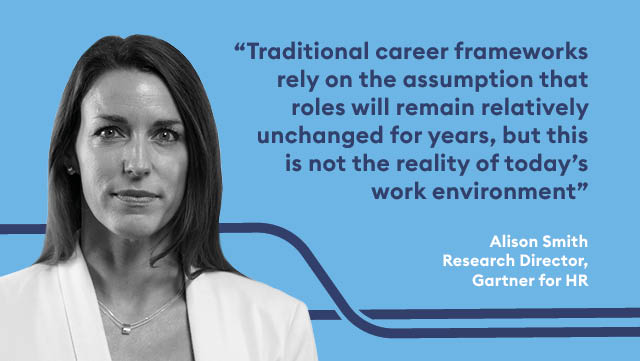How can we find and develop talent with in-demand skills alongside ongoing disruption and rapidly evolving needs?
The disruption of the COVID-19 pandemic has resulted in 58% of the workforce needing new skills to get their job done. It has accelerated a long-term trend around typical skills requirements; the total number of skills required for a single job has been increasing by 10% per year for the last four years.
Gartner’s recent research identifies a new approach to building skills that relies less on formal training and more on the use of ‘skills accelerators,’ and specifically leveraging skills adjacencies. This strategy has been used successfully by businesses when the external labour market can’t meet a specific skill need or in cases like today’s environment where many organisations are under a hiring freeze.
The need for increased transparency into employee skill sets
When considering skills adjacencies, HR leaders will need to collect information on current employee skill sets to map out secondary and tertiary skills – the best place to start. At first glance, this may seem overwhelming, resource-intensive and too time-consuming to be useful. Indeed, not only are full skills inventory exercises difficult to do, they often fall quickly out of date.
Instead, many leading organisations are focusing on collecting key skills data that is just comprehensive enough to be insightful. They rely on employees to keep the inventory up to date with help from their managers.
In addition to helping employees define their skills and skills needs, leading organisations take the next step and work with employees to determine their aspirations, and potential next development or career steps. Developing a skills portfolio like this enables employees to document who they are, what they know and where they have been, as well as the support they can provide to others.
The skills portfolio allows the company to better fill critical roles and direct employees to critical skills needs by examining employees’ existing portfolios.
Why it's important to identify and mobilise skills adjacencies
Once HR leaders have identified a critical skills requirement the business needs to address, they must determine which secondary or tertiary skills to begin building upon. The goal is to identify available adjacent skills that can be quickly leveraged to begin to deliver the desired outcomes.
Some organisations are using machine learning and large data to identify and unlock the power of skills adjacencies at scale. For example, Gartner uses TalentNeuron which gathers talent supply and demand data from over 65,000 sources every week. The tool then uses artificial intelligence to identify a network of adjacent skills mapped across industries and roles.
While TalentNeuron is an example of how big data is successfully being used to identify skills adjacencies, it is not the only option. Some progressive HR leaders have started to pursue similar big data strategies by partnering with their own internal data science teams.
Encouraging flexible career progression can help companies acclimatise to changing environments
Traditional career frameworks rely on the assumption that roles will remain relatively unchanged for years, but this is not the reality of today’s work environment.
The use of skills adjacencies intensifies this need to move away from more traditional career path structures. As skills adjacencies begin to uncover new connections and career options, career paths will need to be more fluid and unrestricted by traditional roles and skills requirements. Career paths need to be flexible enough to enable employees to move around in (often unconventional) ways that allow the organisation to best leverage employees’ skills adjacencies.
By uncoupling the concept of “progress” away from just roles and titles, organisations empower employees to be dynamic and ready to change course as needed.
Last year, 74% of organisations froze hiring in response to COVID-19 and many are still struggling to manage the widening skills gap in their organisation in 2021. As economies recover, the labour market will boom once again. But with a skills adjacencies strategy in place, HR leaders can focus on hiring talent strategically rather than scramble to fill skills gaps.
Register for insights and updates or implement one of our levy-funded leadership programmes by clicking on the buttons below.

















